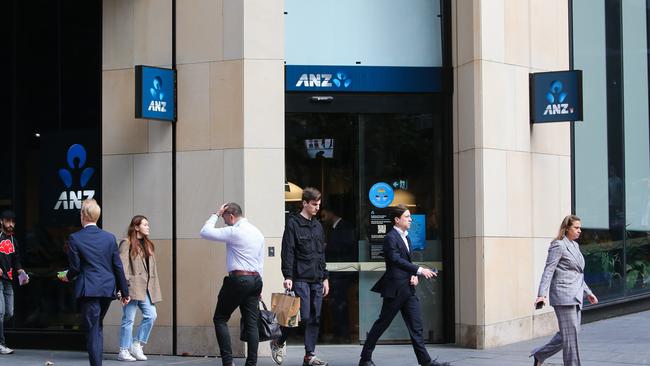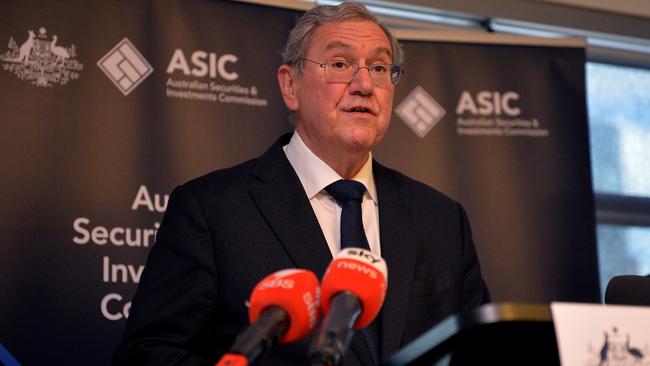ANZ fails to appeal $2.5bn share placement flop court ruling
ASIC has warned ANZ’s board needs to carefully consider its compliance culture, after the bank’s failed appeal against a finding it misled the market over a $2.5bn share raising.

Business
Don't miss out on the headlines from Business. Followed categories will be added to My News.
Australia’s top financial regulator has warned ANZ’s board needs to carefully consider its compliance culture, as the Federal Court knocked out an attempt to appeal a finding the bank misled the market over a $2.5bn share raising.
Speaking after the Federal Court judgment, which threw out an appeal by ANZ, Australian Securities and Investments Commission chair Joe Longo put the bank on notice over its conduct, including how it approaches and responds to potential wrongdoing within its ranks.
Mr Longo said the court decision on Wednesday showed ANZ’s decision to not inform the market about a $790m shortfall in its 2015 capital raising showed the bank had failed in its responsibility to keep investors informed.
“I see this decision as being a timely reminder to the market of the standards that are required,” he said.
ANZ sought to contest ASIC’s initial case filed in 2018, alleging the bank failed to disclose to shareholders the failure to fill its share placement.
JP Morgan, Citi, Deutsche Bank, the co-lead managers of the placement and ANZ colluded to not reveal the $790m overhang.
The placement came amid a scramble by ANZ to bulk up its capital reserves after new laws aimed at strengthening bank balance sheets.
A court earlier found ANZ had failed to inform the market, with Justice Mark Moshinski handing down a judgment in ASIC’s favour last year, finding the shortfall information relating to the capital raising was material.
But ANZ sought to appeal the finding to the full bench.
Mr Longo said ANZ’s board had to reflect on the bank’s conduct and “what matters it wants to take on in court”.
“It’s really a matter for the ANZ board to reflect on these circumstances and see what changes, if any, they need to be making in their approach to these issues,” he said.

ANZ chief executive Shayne Elliott told The Australian on Wednesday the bank would now draw a line under the 2015 matter and not pursue it further.
Mr Elliott also noted that given the events occurred nine years ago, the bank had instituted change around the handling of market disclosures.
“We went through a whole bunch of changes in terms of the way we think about disclosure … from a governance point of view, where we set our tolerances etc,” he said. “So it’s a vastly different ANZ today when it comes to disclosure anyway.”
Mr Elliott expected the board to discuss the case at a meeting on Thursday and further consider its implications.
“We’ll obviously take time to think about what more we need to do,” he said. “We felt this was an important test case around an interesting point of law and an important market around underwriting, and the ability of organisations and their responsibility in raising capital.
“We wanted to get greater clarity, and we felt that it was worth taking that final step to appeal to get that. I mean it’s still not entirely black and white.”
Mr Elliott said the ANZ case had put the Australian issuers of capital on “heightened alert” regarding their continuous disclosure obligations.
The full bench of the federal court knocked out ANZ’s appeal, with Justices Michael Lee, Catherine Button and Sandra Markovic striking out the bank’s arguments.
Justice Lee found investors “would have held an expectation that the underwriters would promptly dispose of allocated or acquired placement shares, and in so doing, place downward pressure on ANZ’s share price”.
Justice Lee warned ANZ could not adopt a “wait and see approach”, noting “once an entity is aware of material information, it must announce the extent of that information immediately”.
The decision leaves ANZ open to a $900,000 penalty and the possibility of a class action by shareholders affected by the overhang.
In a market update ANZ said it lodged its appeal “as it believed financial market participants would benefit from further guidance from the full Federal Court”.
Mr Longo said attempts to appeal the court’s earlier finding, or run marathon legal fights, was not a decision to be made by a general counsel but one for ANZ’s board. “This is a matter that the board has to take responsibility for, whoever’s advising the board. It’s in the end, it’s the board’s decision what it does or doesn’t do,” he said.
The case is a success for ASIC, after the Australian Competition and Consumer Commission took a run at the investment banks behind the capital raise, alleging they engaged in cartel-like behaviour in their conduct after the flop. The ACCC abandoned its case after the Commonwealth Department of Public Prosecutions withdrew charges against several executives.

ANZ’s loss comes as the bank faces down an ASIC investigation into the bank’s markets team amid allegations senior traders manipulated government bond prices and futures markets ahead of a $14bn issuance last year.
As revealed in The Australian, the Australian Office of Financial Management, the agency charged with placing and managing Australia’s government debts, contacted ASIC in July 2023 questioning irregularities in the placement and management of its $14bn bond. The matter prompted ANZ to conduct a broader probe into conduct within its markets division. ANZ acted as a joint lead manager on the deal alongside Deutsche Bank and National Australia Bank.
On Wednesday, Mr Elliott said the bank was considering changes to its code of conduct in light of conduct issues identified after an internal review of behaviour in its markets division.
A ban on alcohol during work hours would prove difficult to implement but ANZ was considering changes to its policies, he said.
Documents released under Freedom of Information show ASIC and the AOFM exchanged rounds of critical documents prior to the formal launch of an investigation into ANZ’s markets team late last year.
Analysts have warned ANZ could face fines of up to $780m from the bond trading scandal, should the bank not resolve the matter at an earlier stage.
ANZ and ASIC signed a peace treaty in 2018 over an earlier trading scandal at ANZ, over allegations its traders rigged the Bank Bill Swap Rate. This also saw ANZ agree to an enforceable undertaking aimed at improving standards in its trading team.
Mr Elliott had warned that he and senior executives would lose their bonuses over allegations of misconduct in the trading team, with the bank sacking three traders in connection to the scandal and an inquiry over workplace culture. A fourth trader received a written warning.
But Mr Elliott earlier said “there is no scandal” telling a parliamentary committee in August the issues around the AOFM placement were “complicated”.
Shares in ANZ closed down 0.13 per cent or 40c to $30.11.
Joyce Moullakis travelled to Singapore as a guest of ANZ.
More Coverage
Originally published as ANZ fails to appeal $2.5bn share placement flop court ruling




